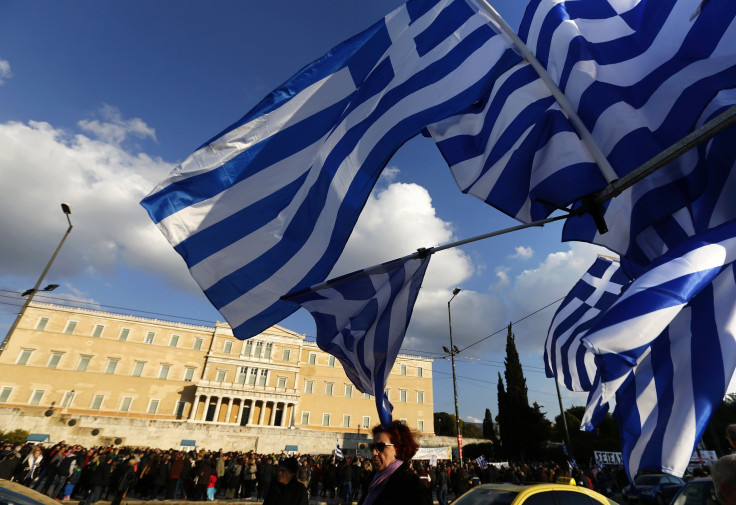Greek Bailout Meeting 2015: Can Greece, Syriza Leader Alexis Tsipras Renegotiate The Country's Debt Package?

Greece's meeting with eurozone finance ministers kicked off Monday in the wake of failed efforts by Greek Finance Minister Yanis Varoufakis to reach an agreement last week on reforms to Greece’s bailout program. The impasse threatens the country’s place in the 19-member country currency block. Greece's current bailout program ends Feb. 28.
Why Greece Is Renegotiating?
Greece wants to renegotiate the terms of its $270 bailout program after the country’s far-left Syriza Party won Greek elections last month. Before winning national elections, the Syriza Party, led by newly elected Prime Minister Alexis Tsipras, staged a revolt against the budget cuts and other austerity measures under the bailout arranged by the European Commission, European Central Bank and International Monetary Fund (known as “the troika”) Greece's previous conservative government had agreed to the terms.
The Issues
Monday’s meeting of eurozone finance ministers takes place against a background of extreme urgency. Hopes Greece and the eurozone might have months to hash out a solution to the country’s debt problems have been replaced by concerns Greece could run out of money within a matter of weeks. Shortly after the Syriza electoral win, Tsipras said he would try to renegotiate Greece's debt agreements, the $270 billion bailout package that has allowed Greece to avoid bankruptcy.
European finance ministers could gamble and insist Greece’s only option is to accept the remaining payouts from its existing bailout and provide an extension to the program. But this would be unacceptable to the Syriza Party, since it would break its pre-election pledge of no more bailouts, Capital Economics of London said in a research note last week.
Greece’s preferred solution is to have eurozone finance ministers bridge the county’s loan so it can meet the government’s near-term financing needs without the bailout conditions. Such a move would allow the Syriza Party to stick to its election promises. It has offered in exchange to meet 70 percent of the conditions attached to its current bailout and implement further reforms. But the idea has received a very cool reception from finance ministers, Capital Economics said. Indeed, Eurogroup Chairman Jeroen Dijsselbloem has said, “We don’t do bridge loans.”
Even if a plan can be worked out, it will only tackle Greece’s short-term financing requirements, setting up future face-offs between Greece and its financiers. “Everyone knows in the back of their mind that the situation in Greece is unsustainable in the long term. Greece simply has too much debt,” said John De Clue, chief investment officer at the private client reserve at U.S. Bank Wealth Management.
Lasting Agreement Unlikely Now
The European Central Bank has already announced it will provide emergency liquidity to Greek banks to the tune of as much as 60 billion euros, meaning Greece may not be forced to get a formal extension from the troika when the current deadline expires.
“Greece will limp along with this option, but they can’t live for more than a couple of months. By our estimate, they could probably buy time because the ECB is not going to let the banks fail,” De Clue said.
The option isn’t permanent, but it could be a good one for Greece if it doesn’t reach a formal extension or renegotiation pact this month.
“I don’t think the financial markets expect an agreement to happen for the next few weeks,” De Clue said.
© Copyright IBTimes 2024. All rights reserved.






















